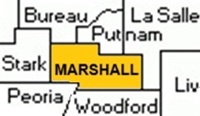
When the history of business activity and commercial prosperity in Henry is written the name of Charles A. CAMP will find honored place on its pages. He is the vice president of the Henry National Bank and a capitalist whose business ability has been manifest in the successful conduct of various important enterprises which have felt the stimulus of his co-operation or benefited by his wise counsel and keen discrimination. A native of Henry, he was born June 29, 1856, and is a son of Abner and Eliza A. (HAM) CAMP. The father was born in New York and in early manhood became a resident of Henry, Illinois, where in 1853 he was united in marriage to Miss Eliza A. HAM, whose birth occurred in Dover, New Hampshire, April 27, 1817. Her parents were Titus and Nancy (PURSE) HAM, natives of New Hampshire and Massachusetts, respectively. Mrs. CAMP's parental grandfather was one of the heroes of the Revolutionary war, while her father, Titus HAM, was a valiant soldier of the war of 1812. By occupation he was a farmer and he had a wide and favorable acquaintance in Dover, where for many years he resided, both he and his wife passing away there. In their family were eight children, two sons and six daughters, which number included Mrs. CAMP. Following their marriage Mr. and Mrs. Abner CAMP began their domestic life in Henry and for some years he engaged in business as a carpenter and contractor, while from 1870 until 1876 he conducted a hotel at Henry. His political support was given to the republican party and he was one of its stanch advocates and also a great temperance worker, his life being characterized by an unfaltering fidelity to those principles and rules of conduct which work for honorable manhood. He died in the year 1888 and was survived by his wife until 1900. They had but two children: Charles A. and Clara Belle.
In the public schools of Henry, Charles A. CAMP acquired his more specifically literary education and later pursued a commercial course at Grand Prairie Seminary, from which he was graduated. Following his return home he spent two years in the dry goods business of E. H. HUTCHINS and six months with Peter WYKOFF. He then took charge of the Camp House, of which he was proprietor for twenty-five years, making this the leading hotel of Henry. He introduced many modern improvements, including a bath house where hot sulphur baths could be enjoyed. He made his hotel a first-class hostelry in every respect and he continued active in its management for many years, or until he retired to devote his energies to other business interests. Upon the organization of the Henry National Bank in 1904 he was elected its vice president and has since served in that capacity. The other officers are: J. W. WATERCOTT, president; P. R. PHILIPS, cashier; and B. A. HOYLE, assistant cashier. These gentlemen, together with Frank YANOCHOWSKI, A. G. HUMPHREY, A. STICKLE and V. O. TURNER, constitute the board of directors. The bank, during an existence of two years, has gained a most creditable place in financial circles and is conducting an extensive and gradually developing general banking business. In addition to his other interests Mr. CAMP is joint owner with E. S. STERRITT of the Henry Telephone company.
In 1881 Mr. CAMP was married to Miss Ella S. LEECH, a native of Hennepin, Illinois. Unto Mr. and Mrs. CAMP was born a son, Ivan C., whose birth occurred in 1882, and who died in 1887.
In his political views Mr. CAMP is a republican, prominent in the ranks of his party in Marshall county. He has served as postmaster of Henry under appointment of Theodore ROOSEVELT since 1903 and was for two years mayor of Henry, having previously served twice as alderman. He gave to the city as its chief executive officer a business-like, practical and progressive administration and it was during his rule that the system of cement sidewalks were installed and a curb line was established. He was chairman of the waterworks and finance committees at the time of the installment of the waterworks. He recognizes individual responsibility in citizenship and has always stood for opposition to misrule in municipal affairs and is a well known champion of those practical movements which produce direct result in public progress and which also look beyond the exigencies of the moment to the possibilities of the future.
Extracted July 2011 by Norma Hass from Past and Present of Marshall and Putnam Counties Illinois, 1907.
| Bureau Putnam La Salle | |||
| Stark |
 |
||
| Peoria | Woodford | ||

